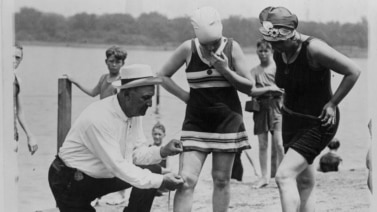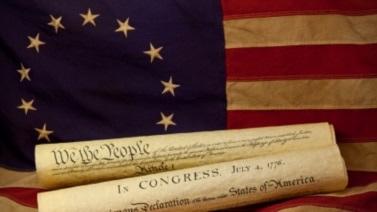The United States Library of Congress is the largest library in the world. It has a huge collection of books and other sources of information, including documents, maps and photographs. The Library of Congress carries out research for the U.S. Congress. But the library’s three buildings in Washington are open to the public. People can visit, use the reading rooms and see the exhibits.
The Library of Congress opened in 1801. Its first home was the U.S. Capitol building. The United States and Britain fought during the War of 1812. During the war, British forces burned the Capitol, destroying many of the library’s 3,000 books.
The third U.S. president, Thomas Jefferson, offered his personal library as a replacement. At the time, Jefferson had the largest personal collection of books in the country. In those times, books were costly. Most were made in Europe and shipped to the United States. Jefferson bought some of the books when he was serving as a diplomat in France.
Jefferson had been born into a wealthy family so he was able to buy the books he wanted. Two hundred years ago, on January 30, 1815, Congress bought Jefferson’s collection of 6,487 books for $23,950. After the purchase, the Library of Congress had more than two times as many books as it had when the British attacked. Today, many of Jefferson’s books are permanently displayed at the library.
Thomas Jefferson loved books and learning. He collected books on almost any subject.
Mark Dimunation is Chief of Rare Books and Special Collections at the Library of Congress.
“He liked books about clever invention. Massive holdings on law and then his great love, architecture.”
He says the original library was very different from Jefferson’s collection.
“It was a working library that members of Congress would need -- law, trade, dictionaries, some classical history.”
Mark Dimunation says Jefferson’s many interests changed the Library of Congress’ approach to collecting.
“It completely altered the notion of what was appropriate for that collection -- from needlepoint designs to architecture.”
Marcelo Alvez is an engineer and college professor from Brazil. He closely studied some of Jefferson’s books.
“It’s quite surprising to see a leader, a president that is interested in philosophy, mathematics, physics, agriculture. So he was a man of huge knowledge that we won’t find today.”
Jefferson wrote the American Declaration of Independence from Britain. He read some of the most important and influential books on philosophy and politics. He also had an English-language copy of Islam’s holy book, the Koran. He got it when he was studying to be a lawyer.
“Jefferson, we think, acquired it because the teaching was that the Koran was Arabic law (so) this would cover his understanding of international law on the part of Muslim countries.”
In 1851, a fire in the U.S. Capitol destroyed many books in the library and almost two-thirds of Jefferson’s collection. After the fire, a large and beautiful building was put up across the street from the Capitol for the Library of Congress.
Mr. Dimunation says the library is seeking replacements of all of Jefferson’s books that were burned. It has been successful in that effort -- the collection is almost complete.
“So out of the 4,000 or so books that I needed to replace to reconstruct Jefferson’s library as it was before the 1851 fire, I am down to just less than 250 books to go.”
After Jefferson sold his beloved books, he never saw them again.
But he soon began building another collection of books. When he was finished he had several thousand. They were sold in 1829 after his death to pay his debts.
The former president loved books, but he also wanted to share them. So even today the Library of Congress still lets researchers use his books. Almost two hundred years after he died, Jefferson is still serving the nation he helped create.
I’m Christopher Cruise.
VOA Correspondent Deborah Block reported this story from Washington. Christopher Cruise wrote the story in VOA Learning English. George Grow was the editor.
Words in This Story
source(s) – n. someone or something that provides what is wanted or needed
exhibit – n. displays of documents, paintings, sculptures or other works of art for people to see
clever – adj. showing intelligent thinking
massive – adj. large in amount or degree
alter(ed) – v. to change (something)
acquire(d) – v. to get (something); to come to own (something)
beloved – adj. very much loved; dearly loved
Does your country’s legislature have its own library? If so, how did it get its books and other materials? And what does it collect? Have you or someone you know ever lost possessions in a fire? We want to hear from you. Write your thoughts in the comments section.

